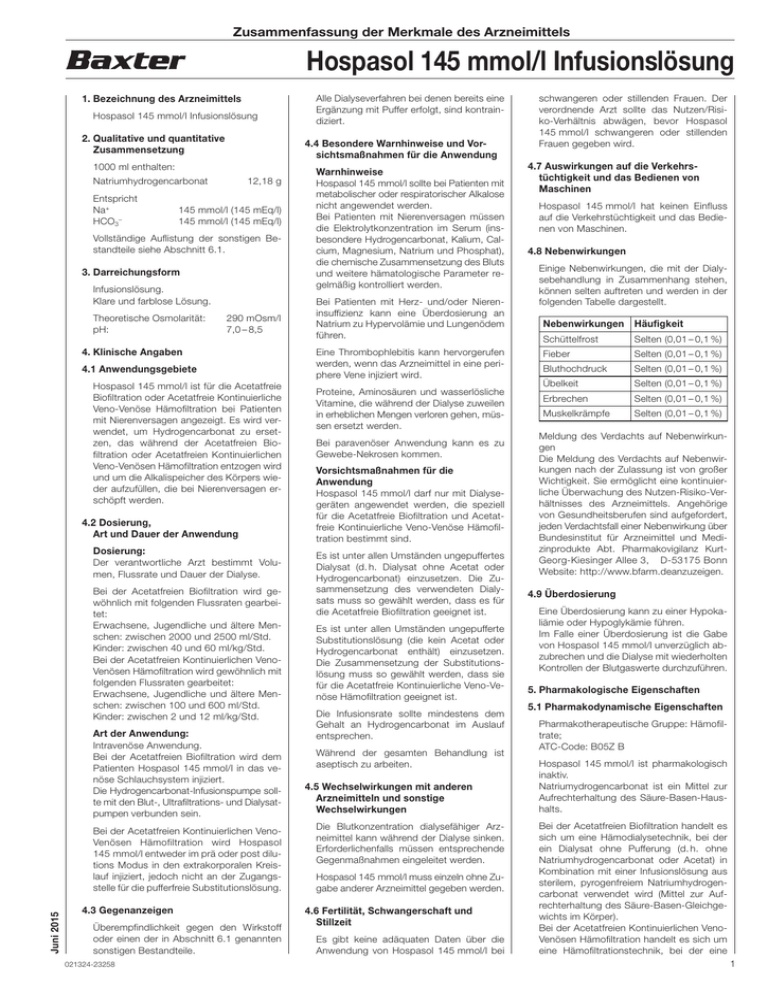
HOSPASOL 145 mmol/L SOLUTION FOR INFUSION


How to use HOSPASOL 145 mmol/L SOLUTION FOR INFUSION
Translated with AI
This page provides general information and does not replace a doctor’s consultation. Always consult a doctor before taking any medication. Seek urgent medical care if symptoms are severe.
Show originalContents of the leaflet
Introduction
PACKAGE LEAFLET: INFORMATION FOR THE USER
HOSPASOL®145 mmol/l Solution for infusion
Sodium bicarbonate
Read all of this leaflet carefully before you start using this medicine because it contains important information for you.
- Keep this leaflet, you may need to read it again.
- If you have any further questions, ask your doctor, pharmacist, or nurse.
- If you get any side effects, talk to your doctor, pharmacist, or nurse. This includes any possible side effects not listed in this leaflet. See section 4.
Contents of the pack:
- What Hospasol 145 mmol/l is and what it is used for
- What you need to know before you use Hospasol 145 mmol/l
- How to use Hospasol 145 mmol/l
- Possible side effects
- Storage of Hospasol 145 mmol/l
- Contents of the pack and other information
1. What Hospasol 145 mmol/l is and what it is used for
Hospasol 145 mmol/l is used in hospitals or special centers during dialysis sessions to correct the chemical imbalance of the blood caused by kidney failure.
It replaces the bicarbonate that the body loses during:
- Acetate-Free Biofiltration (AFB) or
- Continuous Venovenous Hemofiltration Free of Acetate (AFCVVHF).
It also helps to restore the body's bicarbonate levels, which are lost when the kidneys do not function properly (kidney failure).
2. What you need to know before you use Hospasol 145 mmol/l
Do not use Hospasol 145 mmol/l
If you are being treated with a dialysis method that uses a supplementary buffer.
Warnings and precautions
Consult your doctor, pharmacist, or nurse before starting treatment with Hospasol 145 mmol/l. It is essential to monitor the concentration of salts (electrolytes) in the blood and the body's acid-base balance. Therefore, the blood composition should be checked regularly.
Pay special attention to the following:
The pH value of the blood. In case of high pH (alkalosis), Hospasol 145 mmol/l should not be used.
The sodium level in the blood, if you have heart and/or kidney failure. An overdose of sodium can lead to fluid retention in the body (hypervolemia) and particularly in the lungs (pulmonary edema).
The blood vessels, as inflammation associated with thrombus formation (thrombophlebitis) can occur if the product is administered through a small peripheral vein.
The level of proteins, amino acids, and water-soluble vitamins in the blood, as significant losses can occur during dialysis.
Using Hospasol 145 mmol/l with other medicines
Tell your doctor, pharmacist, or nurse if you are using, have recently used, or might use any other medicines.
You must do this because the concentration in the blood of some of these medicines may decrease during treatment with Hospasol 145 mmol/l. Your doctor will decide if any of the medicines need to be changed.
Pregnancy, breastfeeding, and fertility
There are no adequate data on the use of Hospasol 145 mmol/l in pregnant or breastfeeding women.
If you are pregnant or breastfeeding, your doctor will decide whether you should undergo treatment with Hospasol 145 mmol/l.
Driving and using machines
Hospasol 145 mmol/l does not affect the ability to drive and use machines.
3. How to use Hospasol 145 mmol/l
Hospasol 145 mmol/l is a product used in hospitals or special centers with dialysis equipment. It should only be administered by medical professionals.
The volume of Hospasol 145 mmol/l and therefore the dose used will depend on the patient's condition. The doctor responsible for the treatment will determine the dose volume.
Do not useHospasol 145 mmol/l if the solution is cloudy or if the packaging is damaged.
All seals must be intact.
If you use more Hospasol 145 mmol/l than you should
An overdose can lead to a too-low concentration of potassium (hypokalemia) and/or glucose (hypoglycemia) in the blood. If an overdose occurs, the administration of Hospasol 145 mmol/l should be stopped immediately, and dialysis should be performed. Continuous monitoring of blood gases should be carried out.
Your doctor will take the necessary corrective measures and adjust the dose.
If you have any further questions on the use of this medicine, ask your doctor, pharmacist, or nurse.
4. Possible side effects
Like all medicines, this medicine can cause side effects, although not everybody gets them.
There are some side effects that may be due to the hemodialysis process, for example:
- nausea
- vomiting
- muscle cramps
- high blood pressure (hypertension)
- chills
- fever
Reporting of side effects
If you experience any side effects, talk to your doctor, pharmacist, or nurse, even if it is possible side effects not listed in this leaflet. You can also report side effects directly through the Spanish Pharmacovigilance System for Human Use Medicines: https://www.notificaRAM.es. By reporting side effects, you can help provide more information on the safety of this medicine.
5. Storage of Hospasol 145 mmol/l
Keep this medicine out of the sight and reach of children.
Do not store below + 4°C.
Do not use Hospasol 145 mmol/l after the expiry date which is stated on the label and on the carton. The expiry date is the last day of the month stated.
Hospasol 145 mmol/l can be disposed of with wastewater without causing harm to the environment.
6. Contents of the pack and other information
Composition of Hospasol 145 mmol/l
The active substanceis:
1000 ml of solution contain: Sodium bicarbonate 12.18 g
Which corresponds to
Sodium, Na+ 145 mmol/l (145 mEq/l)
Bicarbonate, HCO3 145 mmol/l (145 mEq/l)
Theoretical osmolality: 290 mOsm/l
The other ingredientsare:
- Carbon dioxide (for pH adjustment)
- Water for injections
Appearance of the product Hospasol 145 mmol/l and pack contents
Hospasol 145 mmol/l comes in a single-compartment bag. The solution is clear and colorless.
Each bag contains an infusion solution of 3000 ml or 5000 ml. The bag is wrapped in transparent film.
Each carton contains three bags of 3000 ml or two bags of 5000 ml and a leaflet.
Marketing authorisation holder
Vantive Belgium SRL
Boulevard d’Angleterre, 2
1420 Braine-l’Alleud
Belgium
Manufacturer
BIEFFE MEDITAL S.P.A.
Via Stelvio 94
23035 Sondalo (SO)
Italy
You can obtain further information on this medicine from the local representative of the marketing authorisation holder:
Vantive Health, SL
c/ Pouet de Camilo, 2
46394 Ribarroja del Turia
Valencia
Spain
Date of last revision of this leaflet:
Detailed and up-to-date information on this medicine is available on the website of the Spanish Agency for Medicines and Health Products (AEMPS) http://www.aemps.es
_______________________________________________________________________
This information is intended only for healthcare professionals:
Hospasol® 145 mmol/l solution for infusion
It is essential to use a buffer-free dialysis solution (which does not contain acetate or bicarbonate). A dialysis solution with an appropriate composition for Acetate-Free Biofiltration should be selected.
It is essential to use a buffer-free substitution fluid (which does not contain acetate or bicarbonate). A substitution fluid with an appropriate composition for Continuous Venovenous Hemofiltration Free of Acetate should be selected.
Hospasol 145 mmol/l should be administered alone, without adding any other medicine, in particular, solutions containing calcium or magnesium, as they may cause precipitation of calcium or magnesium carbonate.
Hospasol 145 mmol/l is injected into the venous return line or into the extracorporeal circuit before (pre-dilution) or after the hemofilter (post-dilution).
The doctor in charge must determine the volume, flow rate, and duration of dialysis.
The flow rates normally used for Acetate-Free Biofiltration are:
- Adults, adolescents, and elderly: 2000 to 2500 ml/hour
- Children: 40 to 60 ml/kg/hour
The flow rates used in Continuous Venovenous Hemofiltration Free of Acetate are:
- Adults, adolescents, and elderly: 100 to 600 ml/hour
- Children: 2 to 12 ml/kg/hour
Instructions for use and handling
Hospasol 145 mmol/l is indicated for use only in dialysis machines specially designed for Acetate-Free Biofiltration (special hemodialysis technique) or for Continuous Venovenous Hemofiltration Free of Acetate.
Consult the instructions for use of the dialysis machine before starting treatment with Hospasol 145 mmol/l.
Do not remove from the packaging until ready to use.
Hospasol 145 mmol/l should only be used if the solution is clear, free of particles, and all seals are intact.
Aseptic techniques should be used throughout the administration process to the patient.
Before connecting and after removing the plug from the bag connector (the safety connector - safelink), disinfectant should be applied to the interior of the same.
Before disconnecting, it is recommended to disinfect the external surfaces of the line connector and the safety connector (safelink).
The solution is for single use. Any unused remainder should be discarded immediately.
From a microbiological point of view, once opened, the product should be used immediately. If not used immediately, the user will be responsible for the time and storage conditions prior to use.
- Country of registration
- Prescription requiredYes
- Manufacturer
- This information is for reference only and does not constitute medical advice. Always consult a doctor before taking any medication. Oladoctor is not responsible for medical decisions based on this content.
- Alternatives to HOSPASOL 145 mmol/L SOLUTION FOR INFUSIONDosage form: HEMOFILTRATION, 2 mmol potassium/lActive substance: HemofiltratesManufacturer: Nikkiso BelgiumPrescription requiredDosage form: HEMOFILTRATION, 4 mmol potassium/lActive substance: HemofiltratesManufacturer: Nikkiso BelgiumPrescription requiredDosage form: HEMOFILTRATION, -Active substance: HemofiltratesManufacturer: Nikkiso BelgiumPrescription required
Online doctors for HOSPASOL 145 mmol/L SOLUTION FOR INFUSION
Discuss questions about HOSPASOL 145 mmol/L SOLUTION FOR INFUSION, including use, safety considerations and prescription review, subject to medical assessment and local regulations.
Frequently Asked Questions















